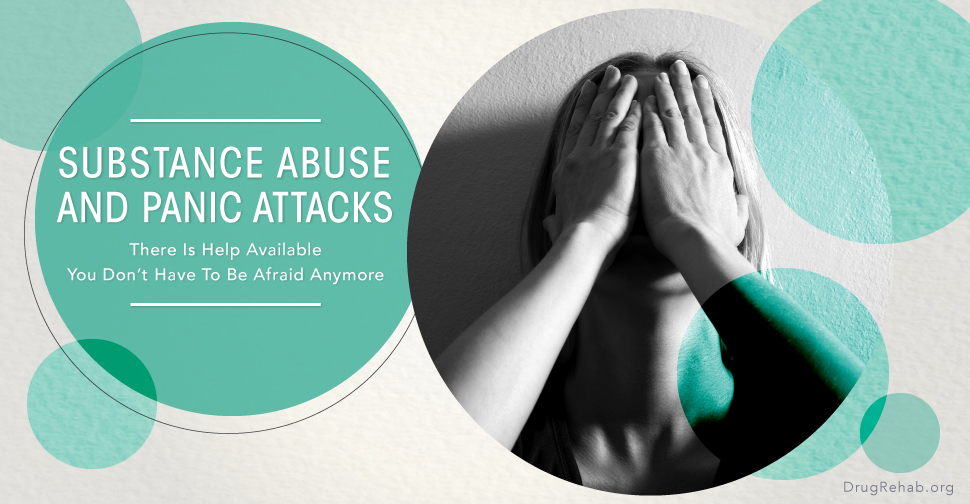
Substance abuse can lead to anxiety disorders, which are characterized by frequent and unexpected panic attacks. Panic attacks are sudden bouts of fear and increased heart rate, or a fear of impending doom. With anxiety disorders–that fear never goes away. Some substances, legal or illegal, can make a person more likely to experience the adverse symptoms of an anxiety disorder. There is treatment available for substance abuse disorders–you don’t have to be afraid anymore.
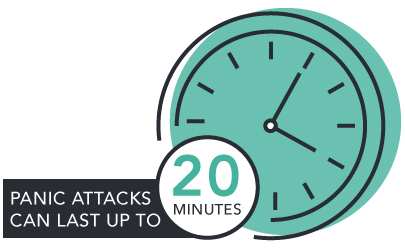 Every little kid walks through a dark alley and gets the heebie jeebies, it’s just part of growing up. As they get older and recognize that there is no boogie man there to get them, they relinquish the fear and grow out of it. Some people go through life with that constant fear that something bad will happen. They very well could be suffering from a panic attack, which is defined by the National Institute of Mental Health as a sudden attack of anxiety and overwhelming fear. Frequently, though many panic attacks are direct results of an anxiety disorder or panic disorder, in which that fear is constant. Certain drugs can trigger a panic attack in an individual.
Every little kid walks through a dark alley and gets the heebie jeebies, it’s just part of growing up. As they get older and recognize that there is no boogie man there to get them, they relinquish the fear and grow out of it. Some people go through life with that constant fear that something bad will happen. They very well could be suffering from a panic attack, which is defined by the National Institute of Mental Health as a sudden attack of anxiety and overwhelming fear. Frequently, though many panic attacks are direct results of an anxiety disorder or panic disorder, in which that fear is constant. Certain drugs can trigger a panic attack in an individual.
Anxiety Disorder And Panic Attacks
As previously clarified, anxiety is a sudden feeling of fear. Anxiety can be a normal reaction to heart wrenching situations–driving a car for the first time, the first day of school, or the moment before a big game. A person suffering from an anxiety disorder can experience this feeling constantly, these bouts of fear are known as a panic attacks. Panic attacks can last for up to 20 minutes. A person with an anxiety disorder also is likely to experience some of these symptoms: (U.S. Library of Medicine):
- Chest pain or discomfort
- Dizziness or feeling faint
- Fear of dying
- Fear of losing control or impending doom
- Feeling of choking
- Feelings of detachment
- Feelings of unreality
- Nausea or upset stomach
- Numbness or tingling in the hands, feet, or face
- Palpitations, fast heart rate, or pounding heart
- Sensation of shortness of breath or smothering
- Sweating, chills, or hot flashes
- Trembling or shaking
- Substance Induced Anxiety Disorder
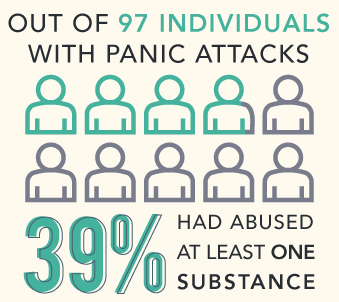 Not every substance will cause a panic attack, however, there are certain drugs that can. Some people suffering from a substance abuse disorder (or better understand by their lack of ability to stop using a drug even when they want to) migh have a delusion that impending doom awaits them if they don’t “get their fix.” A person suffering from a heroin addiction might constantly think about the drug, but if there is none left? Well that’s when the fear of withdrawal, or fear that they won’t get high again might set in. In a study conducted by the U.S. Library of Medicine, “Of 97 individuals with panic, 39% had abused at least one substance.”
Not every substance will cause a panic attack, however, there are certain drugs that can. Some people suffering from a substance abuse disorder (or better understand by their lack of ability to stop using a drug even when they want to) migh have a delusion that impending doom awaits them if they don’t “get their fix.” A person suffering from a heroin addiction might constantly think about the drug, but if there is none left? Well that’s when the fear of withdrawal, or fear that they won’t get high again might set in. In a study conducted by the U.S. Library of Medicine, “Of 97 individuals with panic, 39% had abused at least one substance.”
Substances That Can Cause Anxiety And Paranoia
The substances associated with panic attacks can vary, but generally, if a drug increases heart rate–it can also increase the risk of a panic attack. Some (but not all) of the different drugs that can lead to a panic attack are: Caffeine; Alcohol; Heroin and other Opioids; Cocaine; Marijuana; Sedatives; Nicotine; and Hallucinogens.
Caffeine Abuse And Panic Attacks
 Caffeine is not always associated with substance abuse; however, it’s still a drug. When caffeine is consumed in heavy quantities, or more than a healthy amount, that’s abuse. Caffeine is a stimulant, and after it’s ingested (whether it’s in a pill form or in a beverage) it raises the heart rate. According to the National Center for Biotechnology information, caffeine is associated with an increased number of panic attacks for people who are predisposed to them.
Caffeine is not always associated with substance abuse; however, it’s still a drug. When caffeine is consumed in heavy quantities, or more than a healthy amount, that’s abuse. Caffeine is a stimulant, and after it’s ingested (whether it’s in a pill form or in a beverage) it raises the heart rate. According to the National Center for Biotechnology information, caffeine is associated with an increased number of panic attacks for people who are predisposed to them.
Alcohol Abuse And Panic Attacks
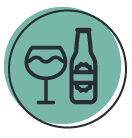 Alcohol is a drug which is sometimes referred to as “liquid courage”, because it can cause a person to do things that they might not normally do. Alcohol can lead to mood swings and temper tantrums–a person who abuses alcohol may exhibit bouts of rage, anxiety, and increased danger to his or herself and others. Withdrawal from alcohol can also lead to symptoms such as anxiety and panic attacks, but it can also lead to insomnia, delirium tremens, sweating profusely, depression, delusions, nightmares, and seizures. According to NCBI, “Alcohol-induced deliriums after high-dose drinking are characterized by fluctuating mental status, confusion, and disorientation.”
Alcohol is a drug which is sometimes referred to as “liquid courage”, because it can cause a person to do things that they might not normally do. Alcohol can lead to mood swings and temper tantrums–a person who abuses alcohol may exhibit bouts of rage, anxiety, and increased danger to his or herself and others. Withdrawal from alcohol can also lead to symptoms such as anxiety and panic attacks, but it can also lead to insomnia, delirium tremens, sweating profusely, depression, delusions, nightmares, and seizures. According to NCBI, “Alcohol-induced deliriums after high-dose drinking are characterized by fluctuating mental status, confusion, and disorientation.”
Marijuana Abuse And Panic Attacks
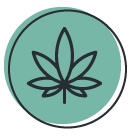 Marijuana can be smoked, consumed, or “dabbed”–the highest dose of tetrahydrocannabinol THC which can be abused. THC is the primary compound found in marijuana, and it can have serious affects on the mind of a person using it. Abuse of marijuana can lead to lack of motivation, mood swings, anxiety, and panic attacks. The U.S. Library of Medicine found that a lifetime of marijuana is significantly related to a lifetime of panic disorder and panic attacks. Not only that, they found that people who abused marijuana in the past year, and currently use marijuana, are more likely to be diagnosed with lifetime panic disorder as well as current panic attacks.
Marijuana can be smoked, consumed, or “dabbed”–the highest dose of tetrahydrocannabinol THC which can be abused. THC is the primary compound found in marijuana, and it can have serious affects on the mind of a person using it. Abuse of marijuana can lead to lack of motivation, mood swings, anxiety, and panic attacks. The U.S. Library of Medicine found that a lifetime of marijuana is significantly related to a lifetime of panic disorder and panic attacks. Not only that, they found that people who abused marijuana in the past year, and currently use marijuana, are more likely to be diagnosed with lifetime panic disorder as well as current panic attacks.
Cocaine Abuse And Panic Attacks
Cocaine is a drug which can be snorted, injected, laced with other drugs, and more. It give a person a false feeling of power, and can lead to behaviors like violence and promiscuity, it can also cause paranoia. Cocaine is a stimulant, and can be extremely dangerous for the heart, it can also lead to severe anxiety and panic attacks. Cocaine abuse often leads to manic behavior and delirious speech. Overdose from cocaine killed approximately 7,000 people in 2015, and withdrawals (often referred to as “a crash”) can lead to depression and craving more of the substance.
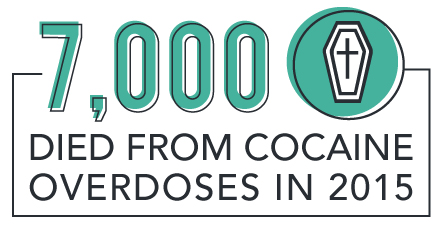
Heroin, Opioid Abuse And Panic Attacks
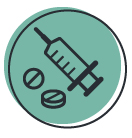 Opioids such as heroin are characterized by spurts of intense euphoria and well-being. Abusing drugs like heroin can lead to anxiety, severe depression, and insomnia. Even after a person stops using opioids, the withdrawals can start after a couple hours and last for several weeks–withdrawal symptoms can be incredibly dangerous and sometimes include paranoia, anxiety, panic, and seizures. With the prolonged withdrawals associated with opioids, relapse is more likely to occur to avoid further withdrawals.
Opioids such as heroin are characterized by spurts of intense euphoria and well-being. Abusing drugs like heroin can lead to anxiety, severe depression, and insomnia. Even after a person stops using opioids, the withdrawals can start after a couple hours and last for several weeks–withdrawal symptoms can be incredibly dangerous and sometimes include paranoia, anxiety, panic, and seizures. With the prolonged withdrawals associated with opioids, relapse is more likely to occur to avoid further withdrawals.
Hallucinogen Abuse And Panic Attacks
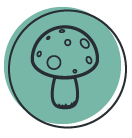 Hallucinogens can give the user visual and mental delusions–or hallucinations. A person who is abusing hallucinogens (such as LSD, Peyote, PCP, and Psilocybin Mushrooms (or Shrooms)) can become dangerously antisocial. They might experience bouts of laughter, which can be followed by unexplainable crying. A person using these kind of drugs can very quickly slip into a drug induced panic attack, or lapse into paranoia. Withdrawal from some hallucinogens can be feeling of emptiness, prolonged trip (or “permi-trip”), inability to eat, anxiety, and fatigue.
Hallucinogens can give the user visual and mental delusions–or hallucinations. A person who is abusing hallucinogens (such as LSD, Peyote, PCP, and Psilocybin Mushrooms (or Shrooms)) can become dangerously antisocial. They might experience bouts of laughter, which can be followed by unexplainable crying. A person using these kind of drugs can very quickly slip into a drug induced panic attack, or lapse into paranoia. Withdrawal from some hallucinogens can be feeling of emptiness, prolonged trip (or “permi-trip”), inability to eat, anxiety, and fatigue.
How To Tell If Someone Is Abusing Drugs
Someone who’s abusing drugs might not be easy to pick out in a crowd, drug abusers may have a lot of practice hiding their addiction. A person who is abusing drugs or hiding an addiction may:
- Spend a lot of time alone
- Lose interest in their favorite things
- Get messy—for instance, not bathe, change clothes, or brush their teeth
- Be really tired and sad
- Be very energetic, talk fast, or say things that don’t make sense
- Be nervous or cranky (in a bad mood)
- Quickly change between feeling bad and feeling good
- Sleep at strange hours
- Miss important appointments
- Have problems at work
- Eat a lot more or a lot less than usual
(According to the National Institute of Drug Abuse)
What To Do For Treatment Of A Substance Abuse Disorder
Experts suggest the following tips for avoiding panic attacks: Abstaining from alcohol, a healthy diet, exercising often, getting enough sleep, or reducing (or avoiding) caffeine, certain cold medicines, and stimulants.
Though sometimes putting an end to substance abuse is more difficult–especially when trying to do it alone. The withdrawals from heavy use of drugs like alcohol can lead to death if not treated by a professional. You might be concerned about your substance abuse problem and panic attacks, if so, you can reach out to us at Drugrehab.org, or you can call to speak to a professional at 1-833-473-4227. All calls are confidential, and our main goal is to help you in your steps to recovery. You don’t have to be afraid anymore.
For More Information Related to “Substance Abuse and Panic Attacks” Be Sure To Check Out These Additional Resources From DrugRehab.org:
- Dual Diagnosis: Anxiety Disorders And Substance Abuse
- Co-Occurring Disorders: Anxiety And Addiction
- Signs Of Xanax Abuse
- Mental Health And Addiction
- How To Change Mental Patterns Of Substance Abuse
Sources
National Institute on Drug Abuse – Signs of Drug Use and Addiction
National Institute on Drug Abuse – Overdose Death Rates
National Center for Biotechnology Information – 9 Substance-Induced Disorders
National Institute of Mental Health – Anxiety Disorders
U.S. Library of Medicine: National Institutes of Health – Relationship Between Substance Abuse And Panic Attacks
U.S. National Library of Medicine – Panic Disorder
U.S. Library of Medicine – Marijuana Use and Panic Psychopathology Among a Representative Sample of Adults


